Feast of Feasts
Advent, Christmas, and Epiphany
with St. Francis
Menu Links
Contact Us
18 East 34th Street
Savannah, Georgia 31401
Advent 2 – Simplicity
“Take care! Be on your guard against all kinds of greed; for one’s life does not consist in the abundance of possessions.” – Jesus in Luke 12:15
Jesus taught us to be careful where we store up treasure, whether on earth or in heaven, lest our possessions come to possess us. This does not mean one does not need the stuff of life, but that the better path is to remain detached in such a way that the things we own are not the most important part of our lives. And in simplifying our lives, we also find more time for a spiritual path. We see this in the life of Francis who embraced holy poverty and, in the process, was able to give so much to the people of his age from the spiritual wealth he accumulated.
Simplicity could be seen as a rigid rule, but we experience it more as a grace, a gift from God. We live in a 1925 bungalow in a less than prestigious part of Savannah. Our house reflects this Franciscan ideal for simplicity of life. Not that living in a 1,050-square foot house puts us on a path to holiness, but it does set limits on what we can acquire. The stuff we buy needs to fit this life. And the bins in the back of our two-car garage point to how much further we have to go in minimizing the stuff we own. Simplicity, no matter how we live into it, is the intentional way we focus our lives on what matters most to us.
Questions for reflection
Are there ways in which you would like your life to be more minimalistic? Where would you start?
Sunday – A Franciscan Story
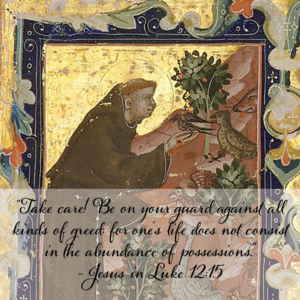 Francis came of age in a family that was part of the new Italian middle class, an upward mobility unknown to previous generations. Italy in the 1200s, like much of the world at that time, was divided into the nobility and the rest. The nobles were the majors, mayores in Italian, and everyone else was minores, meaning minor. Francis’ father, Pietro de Bernadone, moved his family from the minors to the majors through a thriving trade in textiles.
Francis came of age in a family that was part of the new Italian middle class, an upward mobility unknown to previous generations. Italy in the 1200s, like much of the world at that time, was divided into the nobility and the rest. The nobles were the majors, mayores in Italian, and everyone else was minores, meaning minor. Francis’ father, Pietro de Bernadone, moved his family from the minors to the majors through a thriving trade in textiles.After Francis returned from his time as a prisoner of war, he was increasingly drawn to radically follow the Jesus he met in the Gospels. To chart his course, Francis looked to the Holy Spirit’s guidance in finding inspiration from Jesus’ life and ministry. One day, he went into the Church of Saint Nicholas in Assisi with his friend Bernard. The two opened a Gospel book three times, trusting that when they opened the pages and Francis put his finger on a random text, that the text under his finger would be a sign from God of how they should live.
Francis and Bernard had a child-like faith as they entered St. Nicholas Church. The Holy Spirit guided them to Matthew 19:21, which told them to “sell all that you have and give to the poor”; then to Luke 9:3, which said to “take nothing on the journey”; and then finally to Matthew 16:24, which said, “Follow me.”
Those three passages were the signs the two needed to simplify their lives and focus on the poor. The example of first Francis and Bernard and then others dropping out of the up-and-coming set to simply follow Jesus was compelling. More and more young men joined the movement. In time, Francis founded a religious order, and he named it the Order of Friars Minor. Intentionally rejecting the mayores, the majors, Francis identified with the commoner, the lost, and the left out. He wanted for himself and those around him, a minor life, grounded in humility and trusting God. Clare of Assisi (1194-1253) later founded the Order of Poor Ladies. Francis then created a middle way for married men and women to follow Jesus as the monks and nuns did, while remaining married. He created a rule for this Franciscan Third Order, whose members are called tertiaries. All three orders emphasized simplicity as part of following Jesus in the way of Francis.
Monday – A Prayer

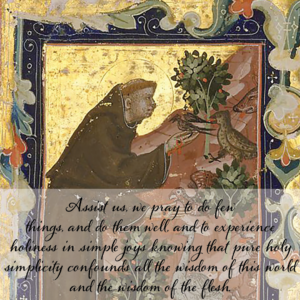 Most merciful God, your Son Jesus Christ looked with compassion on his friend Martha who was worried and distracted by her many tasks, teaching her there is need of only one thing, and extolling her sister Mary for choosing the better part. Assist us, we pray to do few things, and do them well, and to experience holiness in simple joys knowing that pure holy simplicity confounds all the wisdom of this world and the wisdom of the flesh. All this we ask in your holy Name. Amen.
Most merciful God, your Son Jesus Christ looked with compassion on his friend Martha who was worried and distracted by her many tasks, teaching her there is need of only one thing, and extolling her sister Mary for choosing the better part. Assist us, we pray to do few things, and do them well, and to experience holiness in simple joys knowing that pure holy simplicity confounds all the wisdom of this world and the wisdom of the flesh. All this we ask in your holy Name. Amen.
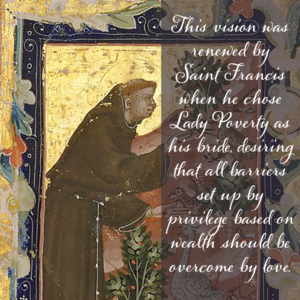 The way of Saint Francis, who was inspired by Jesus, has been, since the beginning, open to whoever is free at heart from all material servitude. To live simply is the “Third Aim” of the Third Order.
The way of Saint Francis, who was inspired by Jesus, has been, since the beginning, open to whoever is free at heart from all material servitude. To live simply is the “Third Aim” of the Third Order.As Days 10 through 12 read in our daily guiding principles: “The first Christians surrendered completely to our Lord and recklessly gave all that they had, offering the world a new vision of a society in which a fresh attitude was taken towards material possessions. This vision was renewed by Saint Francis when he chose Lady Poverty as his bride, desiring that all barriers set up by privilege based on wealth should be overcome by love. This is the inspiration for the third aim of the Society, to live simply.
“Although we possess property and earn money to support ourselves and our families, we show ourselves to be true followers of Christ and of Saint Francis by our readiness to live simply and to share with others. We recognize that some of our members may be called to a literal following of Saint Francis in a life of extreme simplicity. All of us, however, accept that we avoid luxury and waste, and regard our possessions as being held in trust for God.
“Personal spending is limited to what is necessary for our health and well-being and that of our dependents. We aim to stay free from all attachment to wealth, keeping ourselves constantly aware of the poverty in the world and its claim on us. We are concerned more for the generosity that gives all, rather than the value of poverty in itself. In this way we reflect in spirit the acceptance of Jesus’ challenge to sell all, give to the poor, and follow him.”
Because I read these principles monthly, simplicity of life is a constant undercurrent—what can I do to live my life more simply? This idea is very au courant right now. From Marie Kondo’s The Life-changing Magic of Tidying Up to Swedish death cleaning, many people are looking for ways to simplify their lives and declutter their homes. To be completely honest, I didn’t begin the process of simplifying my life nearly 20 years ago when I became a postulant in the Third Order. Years earlier, Frank and I decided to start simplifying our lives after hiking the Appalachian Trail in 1988. It was that thru-hike that brought together my love of the outdoors and my love of simplicity (you can only carry so much in a backpack), and made me realize that Franciscan spirituality is my spiritual path.
So, with more than 30 years of simplifying under my belt, my advice would be to start slowly. Even 30-plus years later, I still have trouble letting go of books and plants! There are so many ways to simplify one’s life—from material possessions to use of time. And there are many excellent resources out there to help you, from books and digital publications like Simplify Magazine, that can be found at: simplifymagazine.com
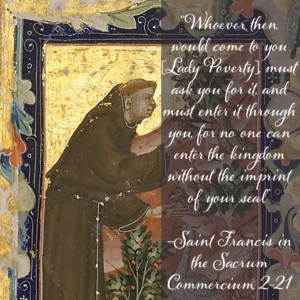 “Whoever, then, would come to you [Lady Poverty], must ask you for it, and must enter it through you, for no one can enter the kingdom without the imprint of your seal.”
“Whoever, then, would come to you [Lady Poverty], must ask you for it, and must enter it through you, for no one can enter the kingdom without the imprint of your seal.”–Saint Francis in the Sacrum Commercium, 2-21
The Bishop of Assisi once said to St. Francis, “I think your life is too hard, too rough. You don’t possess anything in the world.” And Saint Francis replied, “My Lord, if we had possessions, we would need weapons to defend them.”
–The Anonymous of Perugia, Chapter III, 17
Questions for reflection
How tied are you to your possessions?
Do you have a possession (an object not an animal or human) that you care for so deeply that you would use a weapon to defend it?
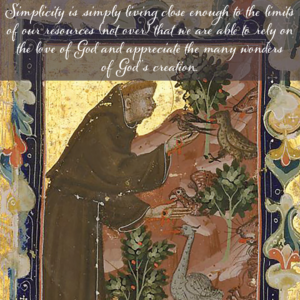 It is not uncommon to associate simplicity with poverty, but they are not the same thing. Simplicity is simply living close enough to the limits of our resources (not over) that we are able to rely on the love of God and appreciate the many wonders of God’s creation. In addition to simplifying our needs and possessions, the spirit of simplicity can be brought to bear on our relationships with other people as well as with God.
It is not uncommon to associate simplicity with poverty, but they are not the same thing. Simplicity is simply living close enough to the limits of our resources (not over) that we are able to rely on the love of God and appreciate the many wonders of God’s creation. In addition to simplifying our needs and possessions, the spirit of simplicity can be brought to bear on our relationships with other people as well as with God.Questions for reflection
We often show our affection for other people with material gifts. Can you think of another way to practice simplicity toward those you care for that doesn’t involve purchasing something?
And other than attending church and tithing, which should go without saying, can you think of other ways to offer yourself to God?
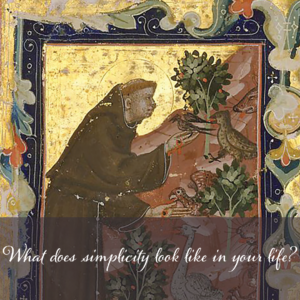 On our wedding day in 1985, I was 22 years old. Victoria was 24. I find our ages startling in retrospect as I considered, at the time, that we waited to get married. My parents’ marriage to one another was a second for each of them, and they were each in their teens when they were married for the first time. Victoria and I had been a couple for three years. We were out of college for 15 months by the day we exchanged our vows at St. George’s Episcopal Church in Griffin, Georgia. We had been working together at the Warner Robins Daily Sun newspaper for most of that time, me as a photographer and Victoria as a writer.
On our wedding day in 1985, I was 22 years old. Victoria was 24. I find our ages startling in retrospect as I considered, at the time, that we waited to get married. My parents’ marriage to one another was a second for each of them, and they were each in their teens when they were married for the first time. Victoria and I had been a couple for three years. We were out of college for 15 months by the day we exchanged our vows at St. George’s Episcopal Church in Griffin, Georgia. We had been working together at the Warner Robins Daily Sun newspaper for most of that time, me as a photographer and Victoria as a writer.We were married well before Pinterest and other social media added more pressure for perfection, seeming to make weddings more performative. Our plan was to keep it simple. The goal was the sacrament of marriage. Victoria chose the wedding dress her mother, Laura Kelly, had worn 25 years earlier for her ceremony in the Chapel at the US Naval Academy. The dress had been handmade by Mary Griffin Kramp, Laura’s grandmother, for her own wedding. Victoria and I worked with her family to make the food for the reception other than the bride and groom cakes. The groom’s cake was a birthday cake for my mother’s mother, Elizabeth Milligan Sullivan, whose 84th birthday fell on our wedding day. Victoria’s stepmother, Deborah, made the bridesmaids’ dresses and the outfit for our flower girl, Victoria’s youngest sister, Kate.
I worked with my family to make all the flowers for the occasion. This was fitting as my Mom owned McGillis Flower Shop in Smyrna, Georgia. My brother, Michael, was an excellent designer working full-time as a florist as well. We mapped out our hopes for more naturalistic flowers and my Mom and brother went to a wholesale house in Atlanta charged with finding what looked good that day. Then that night after the rehearsal dinner, we gathered in a hotel room to put together everything we needed with the real pros handling the difficult pieces and most everyone taking part in assembling the bouquets, corsages, boutonnieres, and altar flowers.
I see value in the simplicity of those wedding plans. Most everything was made by our families with an emphasis, as with the flowers, on what was in season. This same path toward simple, fresh, and local has transformed cooking in our lifetimes, with top chefs taking the same attitude toward ingredients that my Mom and brother took toward the flowers for our wedding. What is in season? What looks good today? In this way we fit ourselves to the creation rather than bending the world to our desires.
I see in this the Franciscan desire for simplicity that goes with the flow, trusting that God is the source of the currents we ride. When we look for what is in season and fresh, we are going with rather than against creation. My mother’s mother, whom we all called Gran, had always cooked this way. When she came to visit, we would invariably opt for the produce stand by the road. The corn looked good, and so we would eat corn on the cob one evening, and she would cut the corn the next day to make creamed corn. We might want the collards, but if they did not look good and the string beans did, then we would be snapping beans that afternoon.
Questions for reflection
What does simplicity look like in your life?
How might you opt for what is in season? What does fresh and local look like in aspects of your life far removed from cooking?
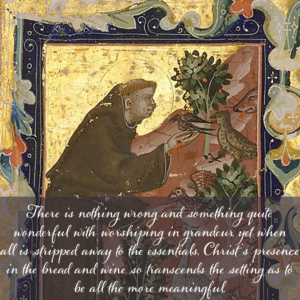 In July and August of 2022, we experienced transcendent worship at Canterbury Cathedral while gathered with bishops and spouses from around the world for the Lambeth Conference of Anglican bishops. The liturgies offered the best of our tradition to the glory of God. We love the way physical spaces of great cathedrals embody both grandeur and mystery. They take one’s breath away by their scale and have innumerable details that can be enjoyed, with the sense that there is always more to discover under the vaulted ceiling. The sounds of more than 1,100 bishops and spouses singing was exquisite. On the penultimate verse, the organ music fell away as the immense space filled with the sounds of praise formed from the accents of more than 165 countries singing in harmony.
In July and August of 2022, we experienced transcendent worship at Canterbury Cathedral while gathered with bishops and spouses from around the world for the Lambeth Conference of Anglican bishops. The liturgies offered the best of our tradition to the glory of God. We love the way physical spaces of great cathedrals embody both grandeur and mystery. They take one’s breath away by their scale and have innumerable details that can be enjoyed, with the sense that there is always more to discover under the vaulted ceiling. The sounds of more than 1,100 bishops and spouses singing was exquisite. On the penultimate verse, the organ music fell away as the immense space filled with the sounds of praise formed from the accents of more than 165 countries singing in harmony.The architectural wonder of an ancient cathedral filled with praise can take nothing away from the simple beauty of the Chapel of Our Savior along Honey Creek on the Georgia coast. There, surrounded by glass, the natural world of the salt marsh is one with simple wood lines of the ceiling. In the right light, the fingerprints of the builders captured in the varnish on the boards are visible. Simply beautiful. And when that chapel is filled with the voices of those gathered for a Happening or Cursillo closing service, nothing can match the joy.
Then there is the worship with no church walls at all, on the dock at Lake Blackshear with Christ Church, Cordele’s Worship on the Water as the congregation arrives by boat each summer. Or compline on the beach at Tybee Island offered by All Saints’ Church.
And yet still, there is the worship of the Community of Saint Joseph, our ministry with persons who are homeless in Savannah. In a field with tents nearby in the woods, the congregation arrives on foot and by bike. The music there is offered by a group that blends those who slept in their own homes the night before playing and singing with those who spent the night nearby in a tent. This is not only worship for persons who are homeless, but with others who are living on the margins, as well.
While the setting could not be more different, the same ability for worship to be transformative is as present in the field church as it is in Canterbury Cathedral. There is nothing wrong and something quite wonderful with worshiping in grandeur, yet when all is stripped away to the essentials, Christ’s presence in the bread and wine so transcends the setting as to be all the more meaningful. The Jesus whose second coming we await has already come in a cave used for a stable.
Questions for reflection
Reduced to the strictly necessary, what is essential in worship?
How might this inform or change all of our worship?
